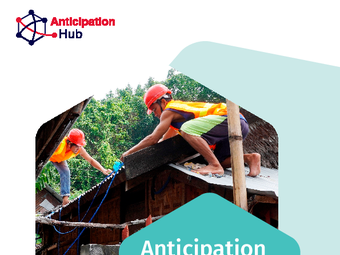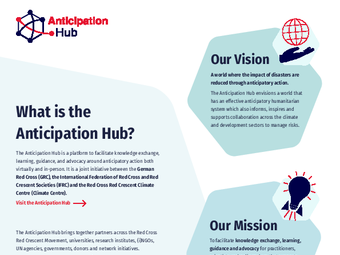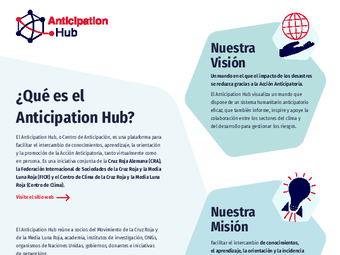Anticipation Hub Strategy 2021 – 2024
Table of contents
- About the Anticipation Hub
- Our Vision, Mission and Aims
- Our values – what drives our work
- Our partners
- Our Governance
- Strategic Priorities
- Strategic Priority 1: Learning, Innovation and Exchange
- Strategic Priority 2: Guidance and Support
- Strategic Priority 3: Policy and Advocacy
- Measuring our progress: monitoring and evaluation
- Download our Strategy
About the Anticipation Hub
The Anticipation Hub is a platform to facilitate knowledge exchange, learning, guidance, and advocacy around anticipatory action both virtually and in-person.
The Anticipation Hub is a joint initiative between the German Red Cross (GRC), the International Federation of Red Cross and Red Crescent Societies (IFRC) and the Red Cross Red Crescent Climate Centre (Climate Centre). The Anticipation Hub brings together partners across the Red Cross Red Crescent Movement, universities, research institutes, (i)NGOs, UN agencies, governments, donors, and network initiatives. The German Federal Foreign Office (GFFO) is the primary and founding funder of the Anticipation Hub.
Many of the world’s disasters are predictable. The effective use of forecasts, risk analysis and early warning information, predictive analytics, pre-planning and pre-arranged financing is enabling anticipatory action – which is becoming a widely accepted approach to save lives and protect livelihoods while providing more dignified, effective, and efficient humanitarian assistance. The COVID-19 pandemic has amplified the need to assess and anticipate compounding risks and the associated cascading impacts. Anticipatory action is moving well beyond its initial focus on direct impacts of sudden-onset hydrometeorological hazards to a much wider range of risks, including in the context of food security, epidemics and pandemics, pests, and contexts of armed conflict and displacement.
What is Anticipatory Action?
A set of actions taken to prevent or mitigate potential disaster impacts before a shock or before acute impacts are felt. The actions are carried out in anticipation of a hazard impact and based on a prediction of how the event will unfold. Anticipatory actions should not be a substitute for longer-term investment in risk reduction and should aim to strengthen people’s capacity to manage risks (Anticipation Hub/ World Disasters Report 2020).
The Anticipation Hub is the result of years of experience, expertise and collaboration across humanitarian actors working to anchor anticipatory action in the humanitarian system – with a view to create a global shift to acting ahead of disasters. Through the Anticipation Hub we can make this knowledge on anticipatory action more accessible for actors inside and beyond the humanitarian sector and broaden knowledge to facilitate scaling up.
The Anticipation Hub seeks to engage with, learn from and inspire actors across sectors – to connect longer-term risk reduction and development planning with effective anticipatory action. As such, anticipatory action presents an important opportunity to bridge the humanitarian, development and climate sectors, and capture synergies across risk reduction, early warning systems, preparedness, response and recovery related policies and interventions. This includes leveraging the technical expertise and resources available from private-sector actors to complement the role of humanitarian and public-sector actors. By facilitating, capturing, and advocating for anticipatory action synergies and collaborations, we maximise our shared capacity to reduce risks and strengthen our ability to anticipate, absorb and adapt to risks.
The Anticipation Hub strives to support practitioners, scientists and policymakers within and beyond the humanitarian sector from global to local levels – and bridge the knowledge gap within and between them. For example, governments and donors can use the Anticipation Hub to collate resources which inform policies and programmes on anticipatory action; universities and research institutes can connect scientific knowledge to practice and conduct action research; practitioners in the anticipatory action landscape can innovate, exchange and collaborate through the Anticipation Hub.
In essence, the Anticipation Hub acts as our shared anticipatory action ‘one-stop-shop' that brings together our collective knowledge, and drives innovation, cross-fertilisation and co-creation across the wider anticipatory action community. The Anticipation Hub is at the beginning of its journey and is expected to continuously evolve through support from its initiators, partners and the wider community of actors embracing anticipatory action.
This Strategy was developed by the initiators of the Anticipation Hub – GRC, IFRC and the Climate Centre in consultation with our partners. The Strategy presents our shared vision, aims, values and strategic priorities for the Anticipation Hub’s first three-year Strategy valid from June 2021 to June 2024.

Our Vision, Mission and Aims
OUR VISION
A world where the impact of disasters are reduced through anticipatory action.
The Anticipation Hub envisions a world that has an effective anticipatory humanitarian system which also informs, inspires and supports collaboration across the climate and development sectors to manage risks.
Our Mission
To facilitate knowledge exchange, learning, guidance and advocacy for practitioners, scientists and policymakers that supports them to jointly work with at-risk communities to collectively achieve anticipatory action.
Our Aims
The Anticipation Hub aims to support practitioners, scientists and policymakers, to do more anticipatory action, do it better and do it together, to jointly embed a culture of anticipatory action inside and beyond the humanitarian sector.
Aim 1 – Do more
The Anticipation Hub aims to increase the accessibility of anticipatory action knowledge - which includes methodologies, tools, resources and access to experts - to facilitate a collective scaling up of anticipatory action initiatives across more hazards and more geographical areas, to cover more people at risk.
We recognise that many actors directly implement anticipatory action initiatives while others create the policies, knowledge and opportunities to enable anticipatory action within and beyond the humanitarian sector. By facilitating continual and evolving knowledge exchange, learning and guidance, the Anticipation Hub endeavours to inspire more actors to embrace the culture of anticipatory action and contribute towards scaling up.
EXAMPLE 1:
The Anticipation Hub provides practitioners easily accessible tools that capture existing knowledge on anticipatory action, like the global map of anticipatory initiatives and early action and trigger databases.
EXAMPLE 2:
The Anticipation Hub provides access to advocacy key messages and success stories to support actors’ global, regional and national advocacy efforts to inform donor and government policies to scale up financing and investment for anticipatory action.
Explore more through the Global Map of Anticipatory ActionAim 2 – Do better
The Anticipation Hub aims to stimulate knowledge co-creation and innovation on emerging topics in anticipatory action. By expanding upon existing knowledge, approaches and methodologies, we can inspire and enable actors to apply anticipatory action effectively and efficiently in multiple contexts and governance settings.
This includes anticipatory action in multi-hazard settings, for slow-onset disasters (e.g. drought), and amidst compounding risks such as conflict, disaster displacement and disease outbreaks. Anticipatory action approaches can also continuously grow to embed more cross-sectoral, innovative and integrated approaches, such as utilising cash-based early action, shock-responsive social protection systems, and coordinated disaster risk financing mechanisms, while making use of emerging technologies. By facilitating and stimulating innovation and knowledge co-creation on emerging topics, the Anticipation Hub aims to enhance the culture of anticipatory action among actors and inspire new applications.
EXAMPLE 1
The Anticipation Hub supports knowledge generation and exchange on anticipatory action in situations of conflict. It does this by investigating how existing methodologies can be adapted and by convening a working group for practitioners on ‘Anticipatory Action in Conflict Settings’.
EXAMPLE 2
The Anticipation Hub hosts a working group on Earth Observation for Anticipatory Action with the German Red Cross and NASA who are stimulating innovation on the use of earth observation to improve hazard forecasting and triggers to better enable anticipatory action.
Read more on Emerging Topics for Anticipatory ActionAim 3 – Do it together
The Anticipation Hub aims to continuously nurture the anticipatory action community, capture synergies with other initiatives and facilitate dynamic and vibrant collaboration and exchange.
The knowledge and capacities generated through more anticipatory humanitarian systems can be used to support and inspire other actors across sectors to enable better risk management. By working collaboratively to capture synergies and continuously exchanging knowledge within and beyond the humanitarian sector, we can stimulate a culture of anticipatory action that results in greater collective impact.
EXAMPLE 1:
The Anticipation Hub facilitates knowledge sharing through webinars, blog posts and networking events and supports yearly regional and global Dialogue Platforms on Anticipatory Humanitarian Action.
EXAMPLE 2:
The Anticipation Hub supports the Anticipatory Action Task Force and working groups in emerging topics, as well as groups led by other initiatives such as the Risk-informed Early Action Partnership (REAP), InsuResilience and START Network to ensure cross-fertilisation of ideas, knowledge sharing and synergy between activities related to anticipatory action.
Explore more on Networks and Working GroupsOur values – what drives our work
The Anticipation Hub ensures that people are at the heart of everything we do. Through our partners and community of users, we strive to increase the capacity and knowledge of practitioners, scientists and policymakers to reach more people at risk and create impact at the ‘last/first mile’ through more collaborative anticipatory action.
The knowledge resources and exchange opportunities available through the Anticipation Hub should strengthen actors’ ability to successfully implement anticipatory action initiatives by working jointly with communities at-risk and continuously delivering impact on the ground.
The Anticipation Hub is a collective and inclusive space for all individuals and organisations working on anticipatory action to contribute knowledge resources and engage in joint learning, guidance and advocacy activities.
Through an open and inclusive partnership approach, our broad range of partners help shape the growth and development of the Anticipation Hub and are directly involved in decision making and priority setting (see more in ‘Our Governance’). We continuously engage with our partners to strengthen relationships and build shared trust and ownership of the Anticipation Hub.
The Anticipation Hub promotes and encourages diversity. The online platform aims to be user-friendly and accessible, hosting open access and multilingual materials.
The content and activities hosted by Anticipation Hub represent a diverse range of knowledge on anticipatory action from different geographical regions, and organisations across science, policy and practice working with, and for, communities at-risk.
The Anticipation Hub strives to capture and share experiences, knowledge and needs from local organisations and communities and increase their prominence alongside national and regional knowledge resources, to inform anticipatory action endeavours.
The Anticipation Hub recognises the crucial importance of bridging knowledge gaps within and between science, policy and practice.
We appreciate how different perspectives, disciplinary skills, and types of expertise and knowledge are needed to implement tailored solutions inside and beyond the humanitarian system.
Bridging this gap drives the growth and co-creation of learning materials and exchange opportunities available through the Anticipation Hub to strengthen the evidence base for anticipatory action.
These connections can facilitate evidence-based learning from both success and failures, and enhance our understanding of how to best engage with communities at-risk and utilise their local knowledge.
We believe in creating an environment that breaks down the formal hierarchies, encourages open dialogue, promotes co-creation and creates a spirit of collaboration.
The Anticipation Hub builds on years of experience using creative, innovative and interactive tools and approaches that stimulate collaboration around anticipatory action to achieve this. We commit to making multi-stakeholder and interdisciplinary knowledge sharing and exchange fun, inclusive and friendly through the Anticipation Hub, both virtually and in-person.
The Anticipation Hub is directly accountable to its partners and community of users. We ensure this by facilitating transparent decision making, priority setting and review of our activities at our Steering Committee, Advisory Group and partner consultation meetings, and through regular progress reporting (see more in ‘Our Governance’).
Resources used for the management of the Anticipation Hub and related events and activities will be used efficiently, and where possible synergies will be captured across partner initiatives.
We also consider ourselves indirectly though morally accountable to communities at-risk, which we expect our partners and community of users are better able to work with, as a result of their engagement with the Anticipation Hub.
Our partners
The power of the Anticipation Hub is found through its dedicated and diverse group of partners, across the key sectors and policy domains needed to scale up and mainstream anticipatory action.
Our partners represent the following organisations across global, regional and national levels (listed in alphabetical order):
Civil Society Organisations and (international) NGOs
Donors
Governments
National Meteorological and Hydrological Services
Network and partnership initiatives
Policy think-tanks
Private sector organisations
Red Cross Red Crescent Movement
Technical/ scientific agencies
UN agencies
Universities and research institutes
The number of Anticipation Hub partners is continuously growing. For the latest update on our partners please see the link below.
Explore our partnersOur Governance
The governance structure of the Anticipation Hub includes the Anticipation Hub coordination team, a Steering Committee, a partner-led Advisory Group, Working Groups, partners, and the community of Anticipation Hub users.
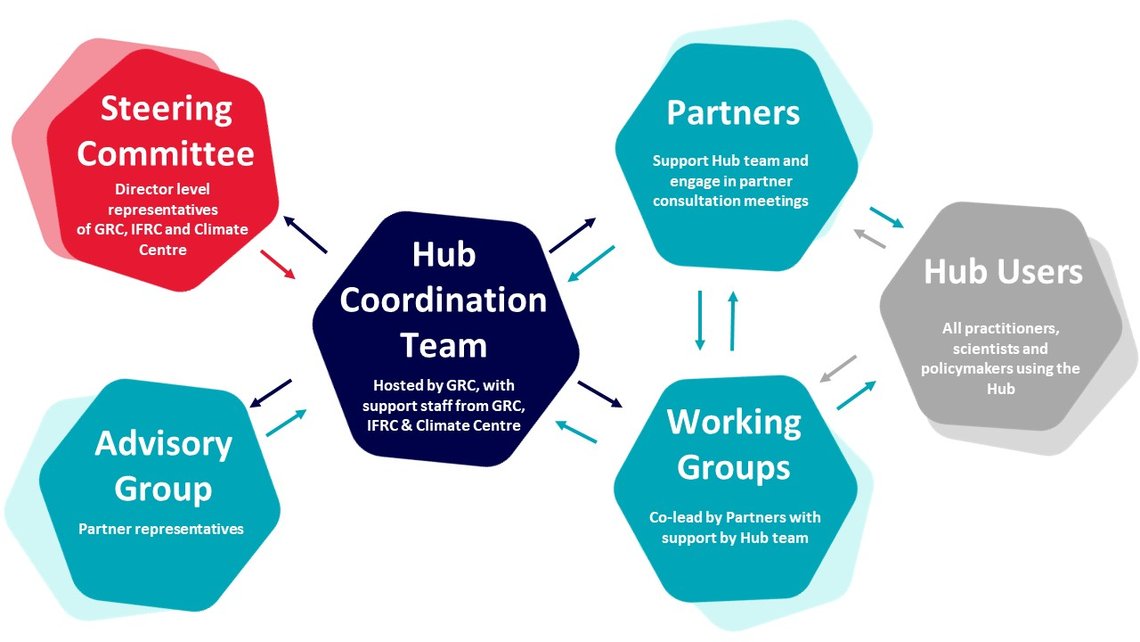
The Anticipation Hub coordination team manages the day-to-day operation of the Anticipation Hub, including implementing and reviewing the Anticipation Hub Strategy in close collaboration with partners. The team consists of a global team of advisors within the German Red Cross (host-organisation), IFRC and the Climate Centre, led by the Head of the Anticipation Hub.
The Steering Committee comprises director level representatives of the German Red Cross, IFRC and the Climate Centre, as the initiators of the Anticipation Hub. They play an important role in providing strategic oversight and direction to the Hub coordination team.
The Advisory Group captures the views and advice of partner organizations to guide and stimulate the growth and sustained development of the Anticipation Hub. Partner representatives, selected initially by invitation, provide strategic advice to the Hub coordination team on planning, priority setting and partner engagement.
Working groups support the Hub coordination team to engage partners to advance knowledge exchange and co-development of knowledge products for the Anticipation Hub. Working groups are co-led by partners, with support from the Hub coordination team and their outcomes help to guide Advisory Group discussions. Working groups are expected to evolve with the growth of the Hub.
Partners of the Anticipation Hub provide input into planning and priority setting through partner consultation meetings, co-lead or participate in working groups, proactively share and co-create content for the Anticipation Hub, and support other knowledge exchange activities. Partners provide vital support to the Hub coordination team to realise the day-to-day activities of the Anticipation Hub.
The wider Anticipation Hub community of users include the practitioners, scientists and policymakers inside and beyond the humanitarian sector who utilise the Anticipation Hub knowledge resources and exchange opportunities.
More information on the governance of the Anticipation Hub including the Anticipation Hub coordination team, Steering Committee, Advisory Group and Working Groups can be found in the link below.
Explore our governanceStrategic Priorities
The Anticipation Hub has three Strategic Priorities to guide and structure our journey towards achieving our vision, mission and aims. These priorities were developed based on consultation with 99 stakeholders in the Anticipation Hub Scoping Study (available here). This Strategy further defines the outputs expected to be achieved under each Strategic Priority, used by the coordination team and partners to guide the Anticipation Hub workplan.
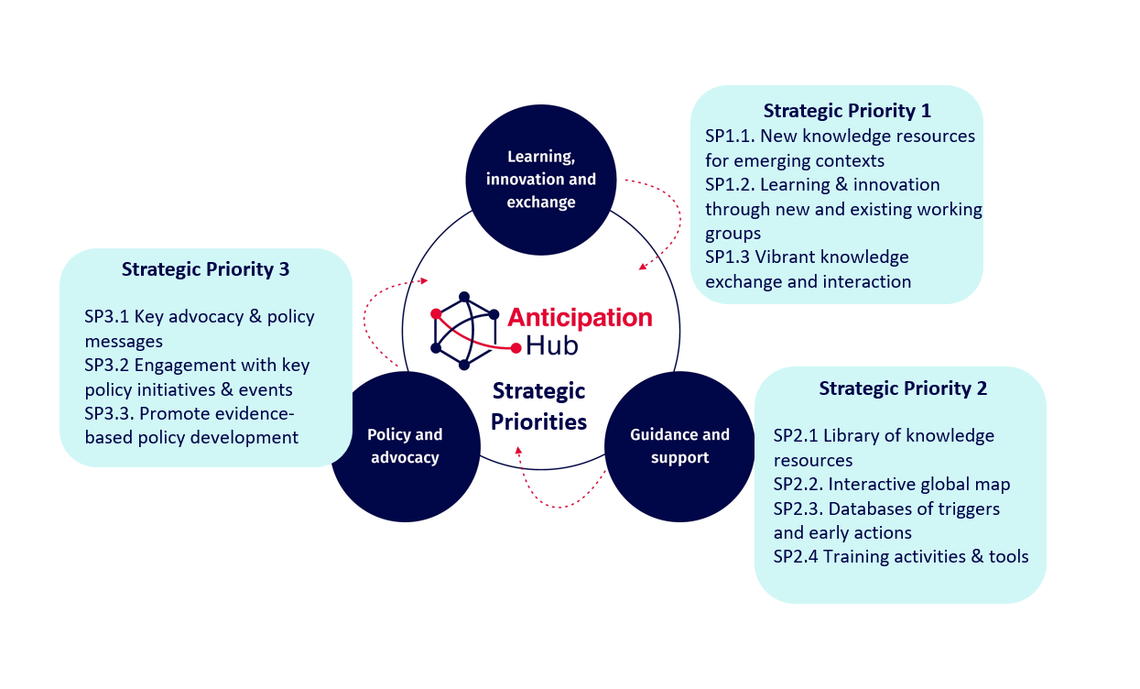
Strategic Priority 1: Learning, Innovation and Exchange
Through this strategic priority we stimulate learning and exchange across our spectrum of partners and the wider anticipatory action community to stimulate collaboration, innovation and co-creation on emerging topics. This in turn will jointly generate knowledge to do anticipatory action BETTER (our Aim 2).
New knowledge resources on anticipatory action for emerging contexts, settings and hazards
Despite the growing array of resources on anticipatory action in science, policy and practice, many knowledge gaps still remain. This is especially true for anticipatory action in emerging settings such as conflict, displacement, epidemics and pandemics, and compounding risks. Working together we can build on these existing knowledge resources and create more tailored, hazard- and event-specific knowledge resources while also looking at compound drivers and multi-layered vulnerabilities in order to increase the use of the anticipatory action approach in new emerging contexts.
The Anticipation Hub also helps facilitate learning around specific integration challenges that require further exploration, e.g. applying different sources of data and scientific information such as earth observation, and integrating anticipatory action with social protection systems. Through support from partners and working groups, the Anticipation Hub helps strengthen the evidence base for anticipatory action by jointly prioritizing and co-creating new knowledge products (e.g. research publications, guidance documents and learning materials) needed to simulate innovation and guide anticipatory action in different settings.
Learning and innovation through new and existing working groups
Establishing and nurturing (technical) working groups is critical for generating learning and innovation on anticipatory action through the Anticipation Hub. Working groups provide an opportunity for collection and exchange of perspectives and knowledge, and the space to co-create new knowledge resources, to help guide anticipatory action in different emerging contexts, settings and hazards, such as in situations of conflict.
The Anticipation Hub works closely with other partner-led technical working groups from global, regional and national levels to capture synergies, cross-promote and ensure alignment with activities. We also maintain an overview of all networks and forums related to anticipatory action, and those that can provide additional insights and knowledge to support anticipatory action.
Vibrant knowledge exchange and interaction
The Anticipation Hub creates a trusted learning and sharing environment that inspires new ideas, stimulates innovation and facilitates interaction and exchange across the anticipatory action community.
Vibrant knowledge exchange and interaction between partners and users of the Anticipation Hub happens through networking (‘mingle’) events, technical webinars, blog posts and discussion forums – co-organised and co-facilitated by our partners. The year-round virtual activities of the Anticipation Hub enable continuity and connection between the Global and Regional Dialogue Platforms on Anticipatory Humanitarian Action.
The Anticipation Hub amplifies the reach of learning and knowledge resources in the library, through related exchange activities, newsletters, event calendar and wider social media engagement to facilitate knowledge brokering across science, policy and practice.
The Emerging Topics section on the Anticipation Hub hosts new knowledge and resources developed while Exchange provides an overview of all forums, networks and working groups related to anticipatory action hosted by the Anticipation Hub, partners or other organisations.
Strategic Priority 2: Guidance and Support
Through this strategic priority we capture the existing evidence and knowledge resources available across the anticipatory action community and make them available in user friendly tools and activities to help guide and support the implementation of MORE anticipatory action in practice (our Aim 1).
Library of knowledge resources on anticipatory action
A library of resources on anticipatory action includes knowledge resources on everything from methodologies and scientific publications to training and advocacy materials, enabling users to quickly access the information needed to support their anticipatory action initiatives.
A quality control process ensures the library is largely populated with evidence-informed materials from global to local levels generated across science, policy and practice. Resources in the library are kept up-to-date with support from partners and are disseminated to the anticipatory action community through regular newsletters, social media and knowledge exchange activities and events.
Interactive global map of anticipatory action initiatives
The Anticipation Hub continuously maps the growing number of anticipatory action initiatives across the globe. The result is an interactive map hosted online, which guides the design and implementation of new initiatives. Country profiles linked to the map provide background information on the risk profile, the hazards being addressed through anticipatory action and the partners working on anticipatory action initiatives. Individual project pages collate information on the status of projects, related outcomes, lessons learnt and resources to help support and guide future partner-led initiatives on anticipatory action. The global map is expected to adapt and grow to meet the evolving needs of the anticipatory action community.
Databases of forecast-based triggers and early actions
The Anticipation Hub hosts and creates databases of forecast-based triggers and early actions. These databases enable users to inform the development of their own tailored triggers and early actions – which are the basis for early action protocols (or anticipatory action plans).
Forecast-based triggers, best developed using an impact-based forecasting methodology, early actions and plans are vital to the implementation of anticipatory action, guiding when, where and who acts ahead of disasters. As new knowledge emerges from practice, these databases will grow to further support actors to apply anticipatory action in other geographical settings, and for non-weather-related hazards, such as in situations of conflict, displacement and disease outbreak.
Training activities and tools
The Anticipation Hub supports training on anticipatory action and facilitates peer-to-peer exchange. These activities help guide the development of early actions, forecast-based triggers in line with an impact-based forecasting approach and the design and implementation of early action protocols (or anticipatory action plans). Providing guidance and support through activities like webinars, multi-stakeholder workshops and simulations helps users to better understand what works and what does not work for anticipatory action.
The Anticipation Hub also facilitates the exchange of guidance and support within the anticipatory action community by connecting people and organizations to experts. One way in which it does this is by hosting online expert profiles and enabling website users to reach out and connect. The Anticipation Hub’s coordination team and partners will also leverage opportunities to broker guidance and support between experts and the anticipatory action community through events and other activities.
The EXPERIENCE tab hosts the global map of initiatives on anticipatory action, along with our Early Action Database and Trigger Database. The LEARN tab hosts different knowledge and learning resources including methodologies and training materials.
Strategic Priority 3: Policy and Advocacy
Through this strategic priority, the Anticipation Hub strengthens the policy and advocacy on anticipatory action at the global, regional and local levels, helping encourage governments, international institutions and donors to integrate anticipatory action into programmes and policies, and invest in scaling up.
Key advocacy and policy messages
The Anticipation Hub supports the development and amplification of advocacy messaging for anticipatory action based on evidence and experiences from implementation in practice. Together with global, regional and national partners, the Anticipation Hub co-creates targeted key messages for diverse stakeholders influencing different components of anticipatory action. This includes donors, national governments, hydro-meteorological services, universities and research institutions, humanitarian actors and community-based organisations.
The Anticipation Hub also informs and amplifies key policy messages developed by other initiatives, such as the Anticipatory Action Task Force. We also explore more thematic based messaging for specific policy domains or topics such as innovative disaster risk financing. Such messaging can help to build a culture of anticipatory action and stimulate investment in scaling up.
Engagement with key policy initiatives and events
The Anticipation Hub is committed to collectively engaging in key global, regional and national policy initiatives and events. This commitment ensures a strong input of experiences and evidence-based knowledge from the field. Jointly with partners we can advocate common key messages, amplify our voices, and emphasise the need for scaling up anticipatory action and mainstreaming it into national disaster risk management and sectoral policies.
Regionally and nationally, the Anticipation Hub uses the strong relationships between practitioners and their stakeholders, often facilitated through their working groups, to jointly amplify messaging on scaling up anticipatory action to influence initiatives and events. At the global level, we work in close collaboration with the Anticipatory Action Task Force, other partners and their initiatives, including the Risk-informed Early Action Partnership (REAP). Together we can jointly inform the design of related sessions, activities and speaking points at high-level events such as COP, G7 Summit, ECOSOC Humanitarian Affairs Segment, and UNDRR Platforms on Disaster Risk Reduction. A listing of these key policy initiatives and events, as well as their outcomes will be available on the Anticipation Hub.
The Anticipation Hub, with particular support from regional- and national-level partners and working groups, collates key evidence demonstrating the impact and benefits of anticipatory action for at-risk communities. By making materials, such as success stories, easily available on the Anticipation Hub and coordinating closely with partners, we aim to promote evidence-based policy development -- especially within national and regional governance systems.
We work in tandem with other initiatives, such the Risk-informed Early Action Partnership (REAP), InsuResilience and Crisis Lookout Coalition, to inform donor policies and promote the integration and mainstreaming of anticipatory action within and beyond the humanitarian sector. At the national and regional levels, we work with partners to strengthen relationships between humanitarian actors and other actors to anchor anticipatory action into their programmes and policies based on evidence gleaned across practice, policy and science.
The ADVOCATE tab hosts advocacy materials including, key messages, policy initiatives and events and success stories.
Measuring our progress: monitoring and evaluation
This Strategy is supported with a monitoring and evaluation plan. Progress on achieving each strategic priority output will be monitored using indicators and targets defined by the Anticipation Hub coordination team. Progress will be reported in line with the workplan update and review by the Anticipation Hub coordination team, in coordination with the Advisory Group members. This monitoring can provide insights into the use of the website, its learning materials and participation at events.
An independent research study will be commissioned towards the end of the 2022 to measure the broader impact of the Anticipation Hub. For this research, partners and others engaged with the Anticipation Hub will be directly invited to report on the extent to which our vision, mission, aims and strategic priorities are being achieved. For example, information will be collected from the Anticipation Hub wider community of users on 1) the effectiveness of the exchange opportunities in generating new ideas and connections, 2) the usefulness of the Anticipation Hub knowledge resources and activities for supporting the implementation and scaling up of anticipatory action in practice and policy development, and 3) effectiveness of the Anticipation Hub in strengthening the evidence base for anticipatory action, facilitating innovation and co-creating knowledge resources. The research is planned to have both quantitative and qualitative aspects, including case studies, narratives, and lessons learnt around the impact of the Anticipation Hub.
It is expected that the specific workplan activities, and the associated targets and indicators will further evolve over the course of the 3-year strategy. These will be reviewed on a regular basis by the Anticipation Hub coordination team and Advisory Group members. Partners will be provided with a yearly progress update on the Strategy, made available online and accessible to the wider community of Anticipation Hub users.
The monitoring and evaluation of the Anticipation Hub’s is intended to support a reflective and reiterative process, allowing the Anticipation Hub to continually improve and evolve, integrating ideas from its initiators, donors, partners and wider community of users.
Versions of the Anticipation Hub workplan (up to 2022) and Monitoring and Evaluation plan will be added online when available


